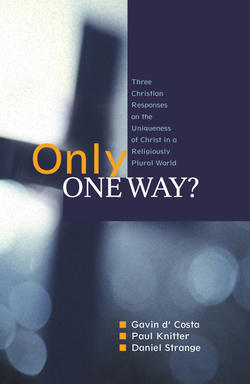Читать книгу Only One Way? - Gavin D'Costa - Страница 17
На сайте Литреса книга снята с продажи.
The Holy Spirit and the religions
ОглавлениеThe Council and John Paul II’s papal teachings after the Council have developed Catholic teaching in pneumatology in very interesting ways. I do not have space to pay attention to this chronological process, so will here summarize some important pneumatological points, with minor commentary on some of them.
First, the Holy Spirit is acknowledged to be at work from the time of creation and before Christ’s incarnation. The Spirit ‘blows where he will’ (John 3.8). This is most explicitly found in a passage in John Paul’s Encyclical, On the Holy Spirit in the Life of the Church and the World (Dominum et Vivificantem, 1986), 53:
[W]e cannot limit ourselves to the two thousand years which have passed since the birth of Christ. We need to go further back, to embrace the whole of the action of the Holy Spirit even before Christ – from the beginning, throughout the world, and especially in the economy of the Old Covenant. For this action has been exercised, in every place and at every time, indeed in every individual, according to the eternal plan of salvation, whereby this action was to be closely linked with the mystery of the Incarnation and Redemption, which in its turn exercised its influence on those who believed in the future coming of Christ. This is attested to especially in the Letter to the Ephesians. (See Eph 1:3–14.) Grace, therefore, bears within itself both a Christological aspect and a pneumatological one, which becomes evident above all in those who expressly accept Christ: ‘In him [in Christ] you . . . were sealed with the promised Holy Spirit, which is the guarantee of our inheritance, until we acquire possession of it. (Eph 1:13f.) . . .23
The Second Vatican Council, centred primarily on the theme of the Church, reminds us of the Holy Spirit’s activity also ‘outside the visible body of the Church’. The Council speaks precisely of
all people of good will in whose hearts grace works in an unseen way. For, since Christ died for all, and since the ultimate vocation of man is in fact one, and divine, we ought to believe that the Holy Spirit in a manner known only to God offers to every man the possibility of being associated with this Paschal Mystery. (Gaudium et Spes, 22; Lumen Gentium, n. 16)
We have a twofold direction of activity in the Spirit’s operation upon which Christology is dependent: (a) in preparing people for Christ before his coming; and (b) in applying the fruits of Christ to people after his coming, both those who have received him in faith and to others. This leaves open the interesting question: what of those after Christ who do not yet know him – is the Spirit’s activity within them as in (a) or of a different quality given that this is now the post-resurrection Spirit? I think the answer is (a) and also of a different quality, given the ontological transformation of all creation in the resurrection, but I am unable to develop this point here.24
Second, we find the Holy Spirit can be found in the hearts of non-Christian people and also in their values, cultures and religions.25 This is an important move, because it allows for both the subjective work of the Holy Spirit in the hearts of women and men as well as the fruits of that activity that is lodged in the cultural institutions, texts, rituals and practices. While these latter are not to be understood sacramentally, in an ex opere operato fashion (see below), this does not diminish both the subjective and historical elements of God’s grace to be found in the hearts of persons and in visible elements in their religions. Third, the Holy Spirit within these religions can cause Christians deep shame at their disposition to doubt ‘truths revealed by God and proclaimed by the Church’.26 It would follow that if the Spirit is at work in other religions, it can also call into question false practices and beliefs held by Christians who have failed to grasp their own faith properly, when for example the faithfulness in prayer five times a day or fasting at Ramadan in Islam, rightly calls into question the way prayer and fasting are ignored by some Christians. This action of the Spirit will also help a deepening grasp of the truths that have been given to us in revelation. I will return to this theme when I deal with mission and inculturation below. Fourth, the Holy Spirit’s work serves as a preparation for the gospel (praeparatio evangelica) and can only be understood in reference to Christ.27 This latter emphasis is important in countering those pneumatologies that have been employed to bypass what is sometimes called the Christological ‘impasse’ in the theology of religions, which end up in danger of being binitarian or unspecific about the nature of the Holy Spirit.28
Fifth, the Holy Spirit moves every ‘authentic prayer’ of those from other religions: ‘We can indeed maintain that every authentic prayer is called forth by the Holy Spirit, who is mysteriously present in the heart of every person.’29 This is a profound acknowledgement that when we speak of the Spirit we speak of the deepest longings and desires within a person, which are to be found in the ‘cave of the heart’. Hence, there is no aspect of the non-Christian’s life that might be untouched by the Spirit, including of course their scripture. Finally, and related to the discussion above regarding salvation and the eschaton, it is through the Holy Spirit that every person is offered the ‘possibility of being associated with this paschal mystery [Christ]’ so that all may have the possibility of salvation.30
These themes will return in much that will be developed below.
